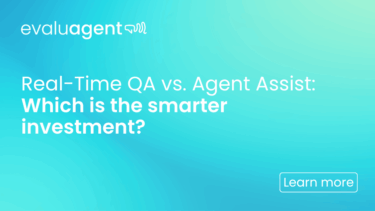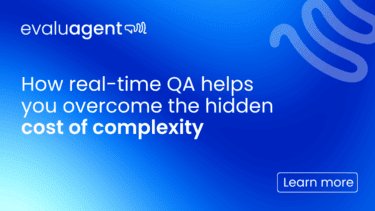Holding effective 1:1 coaching sessions with agents is known to have a huge impact on employee motivation. In a recent survey, more than half of customer support workers said they wanted more communication and feedback yet inconsistencies across large teams are common. One supervisor may have created their own coaching form, whereas another could simply be having lots of undocumented and unstructured conversations.
In this blog we’re including three downloadable coaching form templates you can adopt to make your coaching more effective and consistent across the contact centre. These models are global recognised and perfectly suited to remote or face-to-face conversations.
Unlike other templates we’ve also included space that gives the coachee an opportunity to reflect and acknowledge the session. Multiple studies show this leads to greater engagement and ultimately a more effective coaching programme.
GROW Coaching Form
A good way of thinking about the GROW Model is to think about how you’d plan a journey.
First, you decide where you are going (the goal), and establish where you currently are (your current reality). You then explore various routes (the options) to your destination. In the final step, establishing the will, you ensure that you’re committed to making the journey, and are prepared for the obstacles that you could meet on the way.
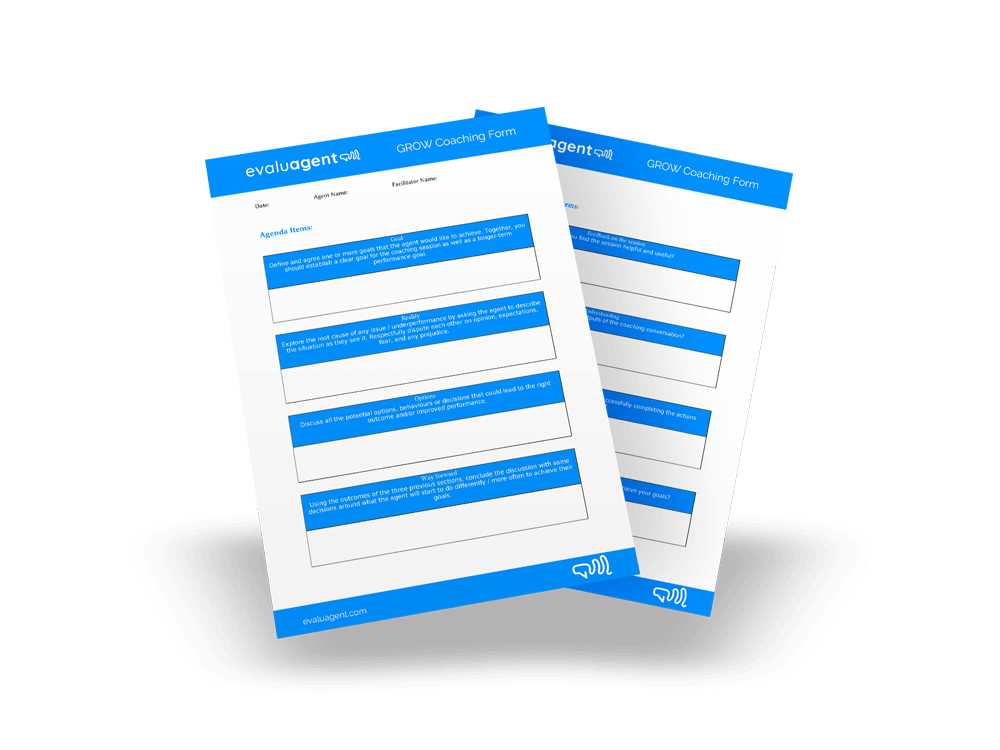
The GROW template includes 4 sections:
- Goal
Define and agree one or more goals that the agent would like to achieve. Together, you should establish a clear goal for the coaching session as well as a longer-term performance goal. - Reality
Explore the root cause of any issue / underperformance by asking the agent to describe the situation as they see it. Respectfully dispute each other on opinion, expectations, fear, and any prejudice. - Options
Discuss all the potential options, behaviours or decisions that could lead to the right outcome and/or improved performance. - Way forward
Using the outcomes of the three previous sections, conclude the discussion with some decisions around what the agent will start to do differently / more often to achieve their goals.
Download your copy
CLEAR Coaching Form
The CLEAR model is not dissimilar to the GROW model however it gives scope for a couple of other elements to be included in the session which are not covered by the GROW model.
The CLEAR model contains five sections so make sure you set at least 60 minutes aside when using this for the first time.
as a longer-term performance goal.
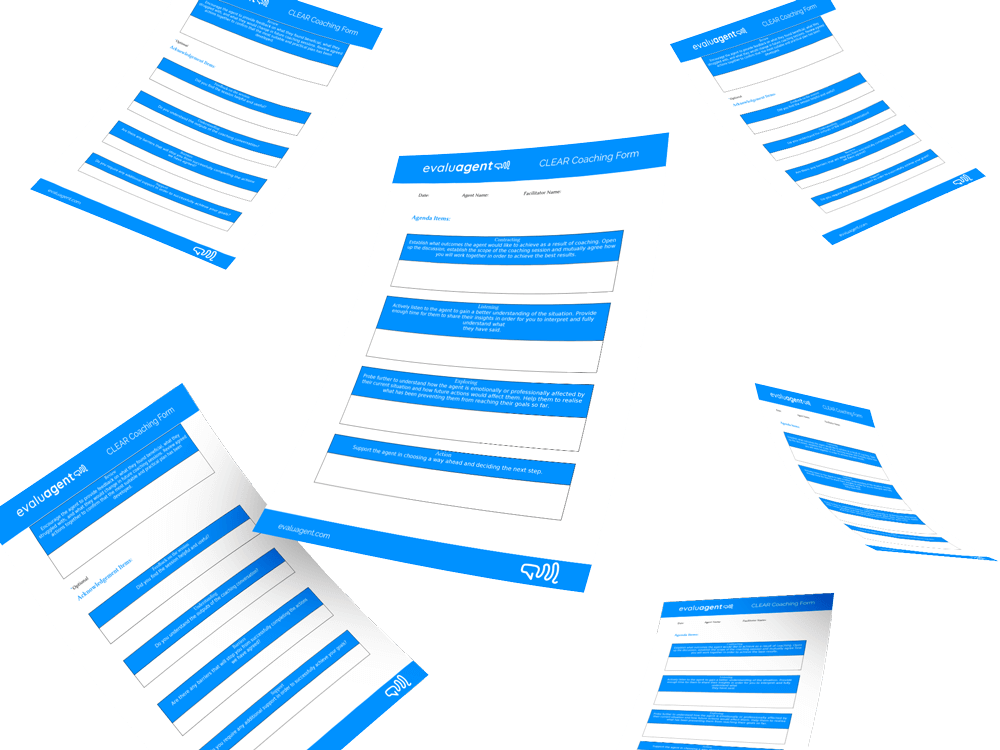
- Contracting
Establish what outcomes the agent would like to achieve as a result of coaching. Open up the discussion, establish the scope of the coaching session and mutually agree how you will work together in order to achieve the best results. - Listening
Actively listen to the agent to gain a better understanding of the situation. Provide enough time for them to share their insights in order for you to interpret and fully understand what they have said. - Exploring
Probe further to understand how the agent is emotionally or professionally affected by their current situation and how future actions would affect them. Help them to realise what has been preventing them from reaching their goals so far. - Action
Support the agent in choosing a way ahead and deciding the next step. - Review
Encourage the agent to provide feedback on what they found beneficial, what they struggled with, and what they would change in future coaching sessions. Review agreed actions together to confirm that the most suitable and practical plan has been developed.
Download your copy
OSKAR Coaching Form
The OSKAR Coaching Framework is a popular coaching model that allows you to focus on solutions to problems rather than on the problems themselves. Unlike the other coaching models, the SCALE element of the OSKAR framework enables an easy-to-use quantitative scale of the coachees feeling. This is advantageous because when using the template regularly it can be easy to see a “measure” of progress towards the desired outcome.
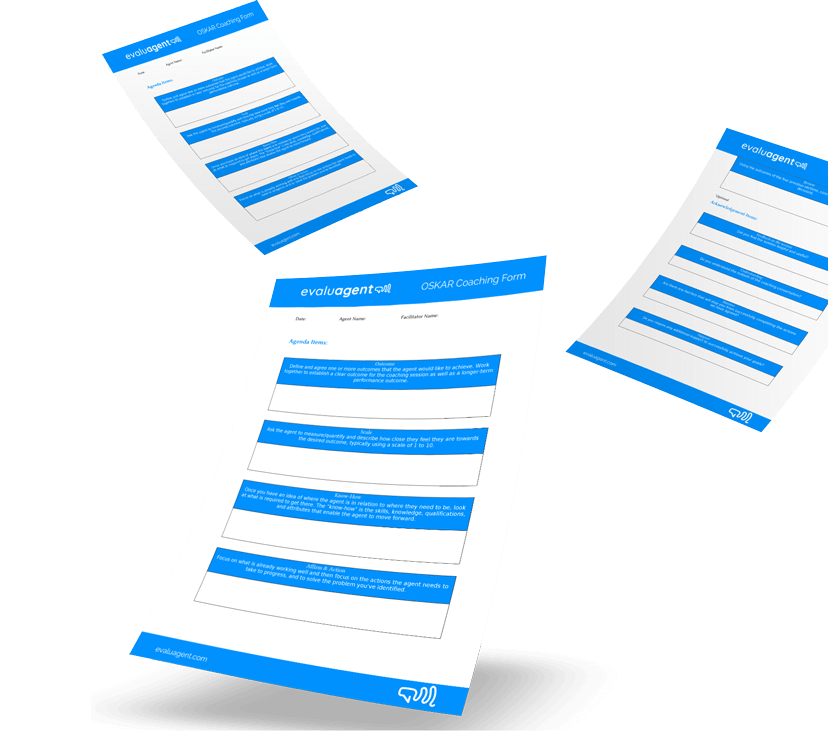
The OSKAR template includes 5 sections:
- Outcome
Define and agree one or more outcomes that the agent would like to achieve. Work together to establish a clear outcome for the coaching session as well as a longer-term performance outcome. - Scale
Ask the agent to measure/quantify and describe how close they feel they are towards the desired outcome, typically using a scale of 1 to 10. - Know-How
Once you have an idea of where the agent is in relation to where they need to be, look at what is required to get there. The “know-how” is the skills, knowledge, qualifications, and attributes that enable the agent to move forward. - Affirm & Action
Focus on what is already working well and then focus on the actions the agent needs to take to progress, and to solve the problem you’ve identified. - Review
Using the outcomes of the four previous sections, conclude the discussion with some decisions as a longer-term performance goal.
Download your copy
EvaluAgent: the Tool That Maximises One-to-One Impact
Our newly launched One to Ones and Actions tool enables your team leaders to schedule, run and follow up on one-to-one meetings.
EvaluAgent pulls in data from both QA processes as well as enabling users to upload external documentation so team leaders can schedule one-to-ones around specific, actionable topics. A library of one-to-one templates reduces pressure on team leaders and allows them to focus on the conversation at hand.
The result? Useful, productive conversations that result in genuine agent engagement, with measurable performance improvements over time.
For those senior stakeholders who want to see tangible benefits from one-to-ones, EvaluAgent offers full visibility over one-to-ones and coaching, with the ability to track completed actions for further granularity of insight.
In the meantime, agents can interact with meetings and actions to own their performance improvement and maximise the value that one-to-one coaching offers them.

